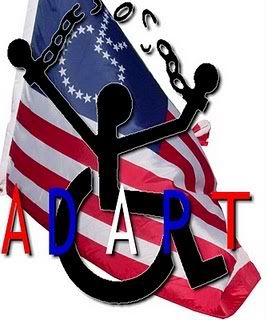I think so. It seems British newspapers cover the topic of disability & sex, but we do not. They also have reality shows with disabled cast members (see below) or even shows built around disabled casts, such as Britain's Missing Top Model, and I think they had some kind of wheelchair dancing show akin to Dancing with the Stars. Yes, we had Heather Mills and Marlee Matlin, there are those TLC shows and Extreme Makeover: Home Edition, there was Josh Blue on Last Comic Standing, but we haven't produced a global sensation and Britain has--Susan Boyle. Let's not forget, How's Your News? didn't make it, and My Deaf Family seems to be having trouble making it onto TV in the first place. I would think TLC would eat it up.
By Geoff Adams-Spink, Age & disability correspondent, BBC News. Pictured is disabled actor Adam Best, who stars in "Eastenders."Whether it is Jim Davidson refusing to perform in Plymouth because the front row of the theatre is occupied by disabled people, or Frankie Boyle lampooning people with Down's Syndrome, comedians often find themselves in hot water when it comes to disability.Disability is one of those things that makes people feel awkward - there is perhaps a deep-rooted, psychological fear of contamination by association.So what we often do when something makes us feel uneasy is to laugh about it.It's still well within living memory that TV comedians would poke fun at people from different ethnic groups - but broadcasting executives soon cottoned on to the fact that they risked alienating growing sections of their audience for the sake of a cheap gag.Performers - Davidson included - had to clean up their act on screen, even if their live performances in clubs and theatres still used traditional targets as the butt of their jokes.Laughing at the expense of disabled people continued to slip beneath the radar of commissioners - it was almost as though to be edgy and alternative, making jokes about disability was seen as some sort of badge of honour.David Blunkett was seldom if ever mentioned on Have I Got News for You without his blindness being ridiculed.A BBC Three chat show once had author Will Self telling the audience that he enjoyed playing a game called "child or dwarf?" with his children in the car.Anyone of small stature would be the subject of speculation and - in the case of a dispute - his son would be sent out of the car to take a closer look. The audience apparently found this hilariously funny.But the TV landscape has changed considerably over the past few years.Coronation Street is the latest of the British soaps to announce a regular disabled character. EastEnders, Hollyoaks and Emmerdale have already done so.There have been disabled characters in Holby City, and Cast Offs on Channel 4 was a big hit.Actress and model Shannon Murray received critical acclaim for her overtly sexy Debenhams posters which resulted from the How to Look Good Naked show, again on Channel 4.Disability - on and off-screen - is being normalised as never before. It is no longer the stuff of fantasy to imagine that a visibly disabled person might read the Ten O'Clock News or present highlights from Glastonbury.After all, Frank Gardner - who was injured in Saudi Arabia - regularly pops up on news programmes.So does Gary O'Donoghue - blind since childhood and one of the army of political correspondents now delivering blow-by-blow accounts of the election campaign.It is highly likely, given all of this mainstreaming of disability, that Mr Boyle's jokes about Down's Syndrome will go the way of mother-in-law jokes or sitcoms like Love Thy Neighbour.We will probably watch comedy archive programmes in 20 years time and ask ourselves, 'Did we really used to laugh at that?'


















1 comments:
As someone with short stature (and 3 centimetres above the upper limit for a Little Person) I am divided at best about the "Child or dwarf" game.
Wow. Today is a year since Susan Boyle came into the spotlight. What a wild strange ride it has been for her and for us.
Post a Comment